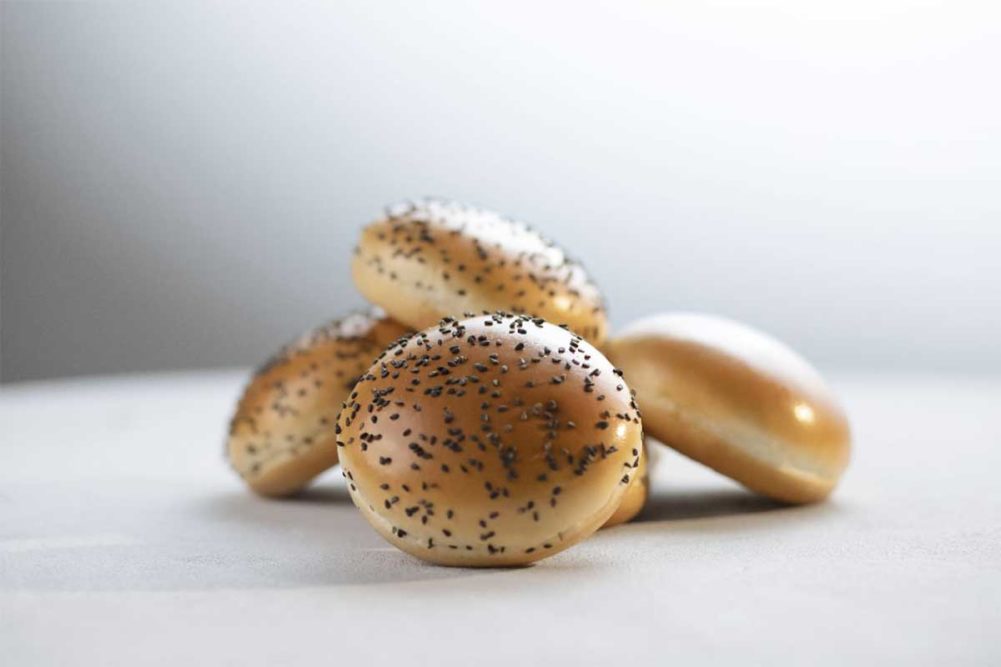Enzymes are just one clean label solution for extending shelf life in baked foods. The world’s plants offer many sources from which ingredient suppliers can pull shelf life-extending properties that work in bakery applications.
Lesaffre’s antimicrobial agent is a blend of fermented wheat and citric acid. The wheat is a source of propionic acid, a natural antimicrobial agent. The citric acid helps to lower the pH of the product so that there is a higher quantity of undissociated propionic acid available.
“When there is an abundant amount of undissociated propionic acid, there is a larger quantity of hydrogen ions available to enter the microbial cell, which reduces the internal pH of the cell and makes it more difficult for the cell to remain at a neutral pH,” said Sherrill Cropper, PhD, new product development lab manager and bakery formulation specialist, Lesaffre. “This, in turn, can have a negative effect on the microbial cell, preventing the growth of the mold.”
AB Mauri North America uses the bacterial fermentation of wheat starch to produce a shelf life-extending ingredient. It contains natural propionic and acetic acids with citric acid added as a pH regulator.
“Effectiveness depends on the pH of the product and the cleanliness of the bakery, but typically a mold-free shelf life of 14 to 21 days is possible with many baked goods,” said Troy Boutte, vice president-innovation and bakery ingredients at AB Mauri North America. “The effectiveness is very similar to adding 0.25% to 0.5% of standard calcium propionate. Propionic and acetic acid inhibit mold by penetrating the mold cell wall, which reduces pH inside the cell. This forces the cell to use energy to correct the pH and slows growth. It can be used in a wide range of baked goods as long as the pH is below 6.0.”
The clean label portfolio from Kemin includes plant-derived ingredients, such as rosemary and green tea extracts. They assist with retarding the oxidation of fats and oils in foods, thereby preventing the development of stale, rancid tastes and smells.
Bartek Ingredients is introducing an ingredient based on malic and fumaric acids. It can be used alone or in combination with natural mold inhibitors, such as cultured wheat or cultured dextrose, and extend the shelf life of baked goods longer than calcium propionate.
“Bakers are being compelled to trade out common preservatives like calcium propionate for pricier natural mold inhibitors that require higher usage levels to achieve the same shelf life,” said Mohammad Emami, senior product marketing manager at Bartek. “Their high cost-in-use compared to calcium propionate, combined with the unpleasant sensory attributes they impart at high levels, make them a challenge to use.”
Bartek’s new ingredient allows for a reduction in the amount of natural mold inhibitor, thereby helping bakers reduce costs and improve overall system performance. When used in combination with natural mold inhibitors, 1% of the acidulant-based ingredient has been shown to extend the shelf life of baked foods from seven to 28 days.
“It mitigates off-flavors and aromas generated by some natural mold inhibitors,” Mr. Emami said. “Any baked good that’s using a natural mold inhibitor or seeking extended shelf life claims is a great application.”
Blue California has launched several nature-based food preservatives produced via fermentation or enzymatic bioconversion with its biotech innovation partner, Conagen. One example is rosmarinic acid, the major antioxidant in rosemary. It has been shown to reduce undesirable browning in baked foods.
“While these compounds are naturally found in nature, our proprietary bio-based manufacturing methods enable us to offer a more sustainable supply of nature-based preservatives of high purity, quality and cost-effectiveness,” said Linda May-Zhang, research, science and innovation officer, Blue California. “They are clean label and considered GMO-free, vegan and kosher. The natural antioxidant p-Coumaric acid, for example, is an antimicrobial found ubiquitously in the plant kingdom. It’s in cereal grains, peanuts, tomatoes, carrots, basil, garlic, vinegar, wine and honey. p-Coumaric acid is shown to inhibit lipid peroxidation and scavenge free radicals. In addition, it has been shown to limit the growth of microbial and fungal strains.”
As retailers and consumers pack more bakery products on shelves, these products will need to last longer or risk being tossed out. To keep garnering sales, bakers are turning to natural solutions that offer their own challenges. With the right solution and know-how, however, bakers can address their shelf life challenges from a formulating and labeling perspective.
This article is an excerpt from the September 2022 issue of Baking & Snack. To read the entire feature on Extended Shelf Life, click here.





